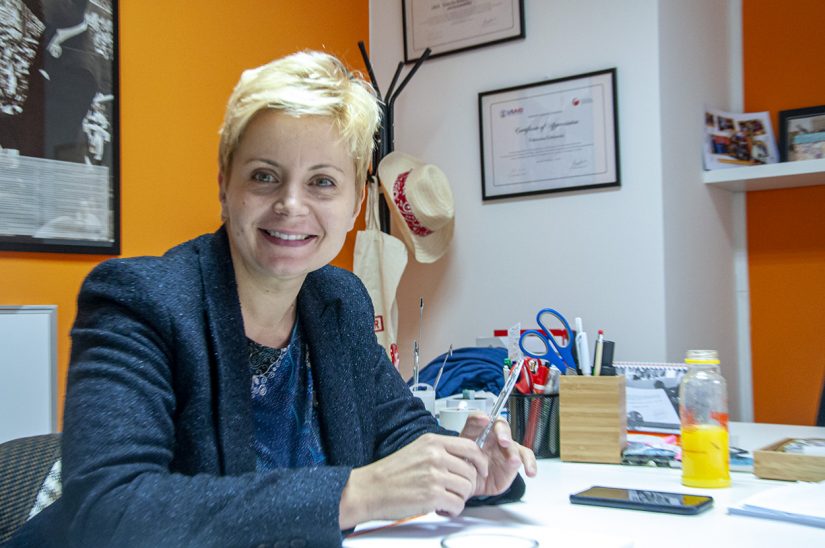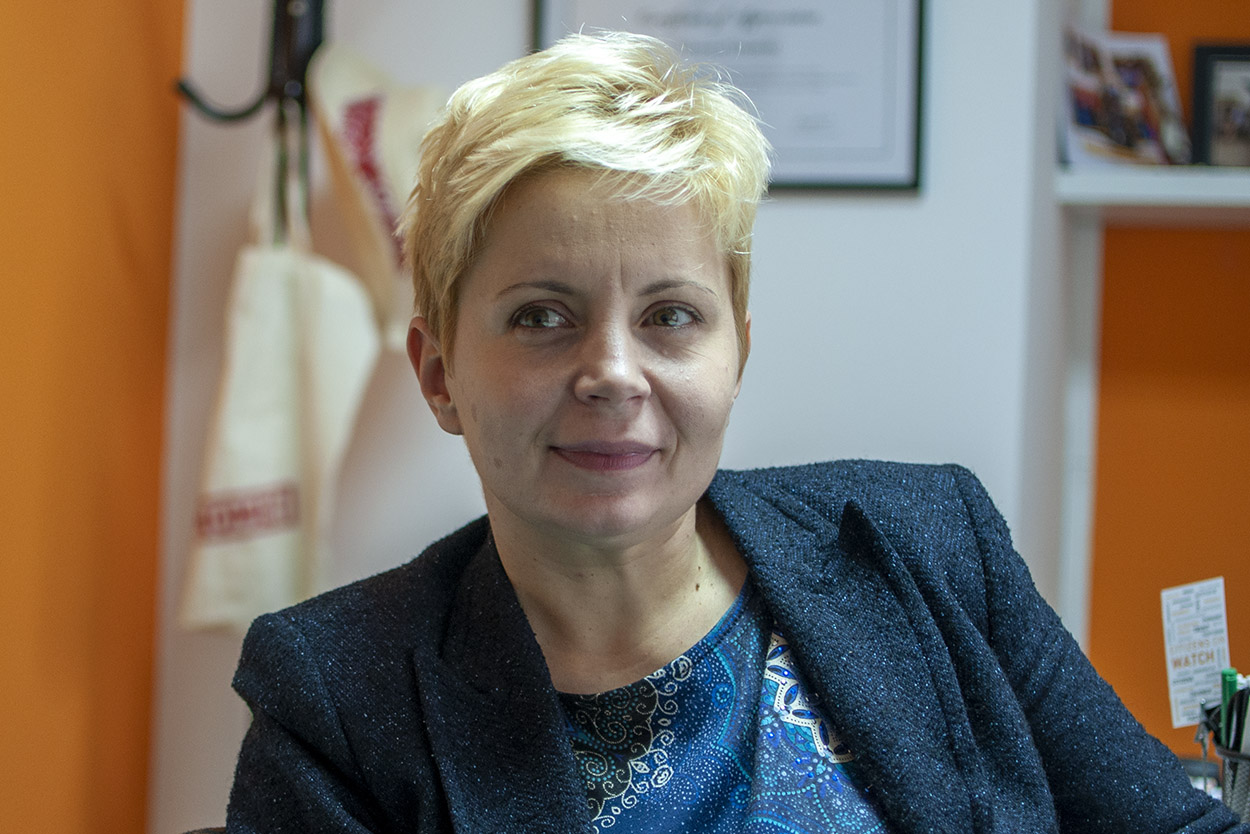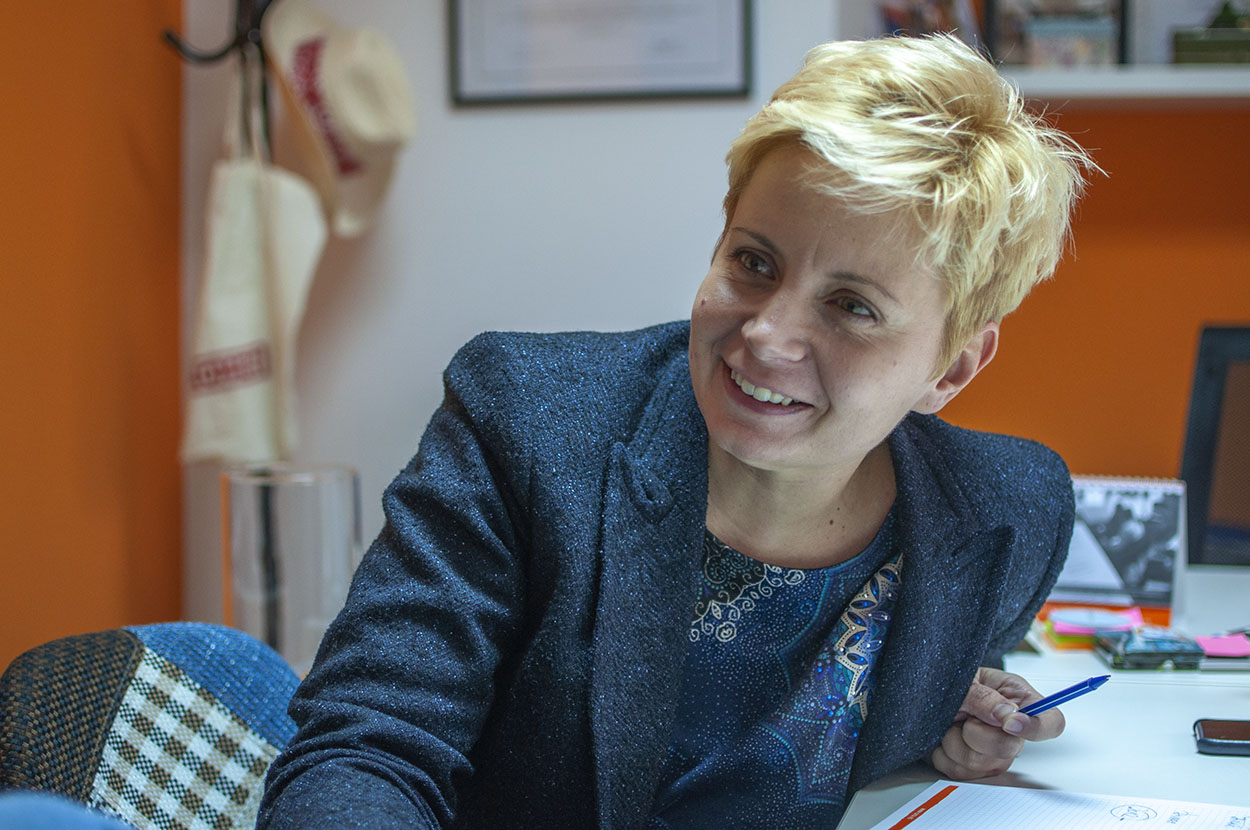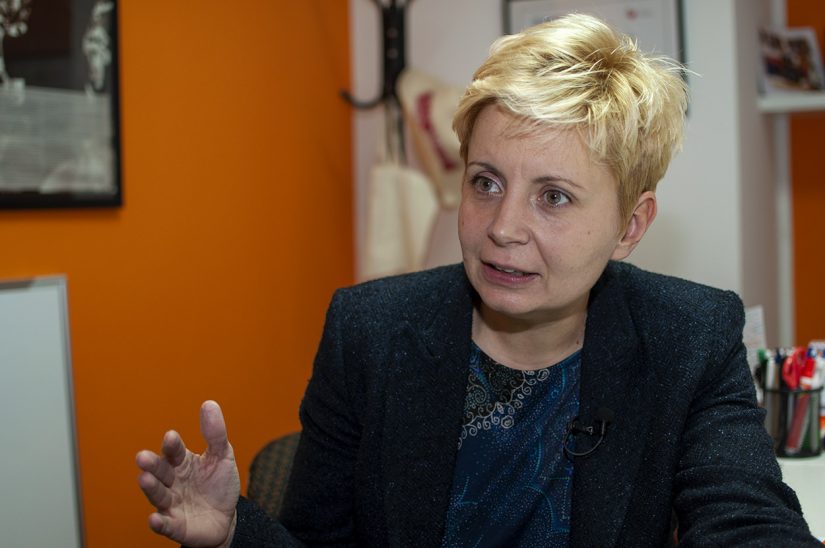Crnjanski: I don’t understand how you can stay on the side-lines when you know you’re being lied to
“We don’t run for a huge circulation, we don’t compete, values matter to us, and I thought that by checking facts and statements, we would be the basis for further investigations of journalists and inspiration for mainstream media reporters to hold politicians accountable and to better inform. I was hoping that under the pressure of the public, certain politicians would assume responsibility for their actions, inactions and that they would be resigning.“
The Truth-o-Meter is marking its tenth anniversary. Established as the first portal in Serbia and the region to evaluate truthfulness and consistency in politicians’ statements, insisting on accountability for public speech, the Truth-o-Meter is today a relevant source of information not only for readers but also for other media. Even in these times when the truth is seriously underrated, it is important whether the Truth-o-Meter proclaims a politician a liar, which is supported by the fact that our portal suffered hacker attack just before we were supposed to publish the results of the “Lie of the Decade” survey. An anniversary slogan suggesting that, in spite of everything, the lie still has the lead over the truth can also be interpreted as defeat. “I wouldn’t say so.“ says Vukosava Crnjanski, the person who brought the Truth-o-Meter “to life” and founded it a decade ago. Mrs Crnjanski, who is a director at CRTA, says today in the interview for a podcast “Into a Microphone” that she may have been naïve when thinking that we would soon live in a more accountable society and that thanks to the Truth-o-Meter we might have a smaller number of untruths and lies“.
“I’m disappointed because the lie is still dominant. On the other hand, I think it’s important to have someone who takes notes of everything. It’s good that citizens can rely on the Truth-o-Meter, at least when it comes to whether or not politicians are telling the truth.“

When you say you are disappointed do you suggest a complete defeat given the circumstances?
Circumstances are problematic, all right. There are big challenges compared to when we started ten years ago. Today, things have changed, not only in Serbia, they have changed globally. The Truth-o-Meter was ten years ago an innovative mechanism to control, or hold politicians accountable, and today we’re living in consequential lies. When I say globally, I’m referring to Brexit, to Trump, etc., so we are not an isolated case. Ten years ago, the society was more focused on professional journalism, a journalist was more important, we didn’t have so many fake news as today.
And it seems that politicians ten years ago were more upset if they were caught lying than they are today?
I think that’s true. I have the impression that politicians, and not just Serbia, have a need to discredit journalists who ask questions, and don’t wish to answer those questions. As if they didn’t even matter to them.
How do you explain that?
The fact is that generally and globally people are losing confidence in democracy, that people are disappointed, and that politicians are playing tricks and games with people’s disappointment and that somehow journalism…
When you say they play games, you mean they nurture disappointment?
Yes, they do nurture disappointment, they play with it and then manipulate it further through falsehoods and lies. When we say “fake news”, it is not only a matter of falsehood but also of a decision. Because when a politician lies, they actually tell people to make a certain decision, I’m specifically referring to citizens, thereby virtually manipulating them into, let’s say, opting for Brexit.
How does it work in our country, do citizens in our country make decisions about their lives based on lies?
Unfortunately, yes. But I think in our country, 11 years ago, when I came up with the idea of the Truth-o-Meter, we were living in a hyper-production of promises, and EU was the most important issue at the time. Afterwards, these deadlines started constantly shifting and that was the only constant narrative in our society. What annoyed me is that no one has ever borne consequences for having lied, for having said something that later happened to be untrue, for citizens who were misled, for journalists who didn’t hold them accountable so citizens could have never reacted to the fact that they were being told lies… I think that nothing’s changed in that sense. We are mostly talking about this democratic political culture where citizens stay on the side-lines and say: “Well, OK, this politics is somehow reserved for politicians and it doesn’t concern me” while in fact it genuinely concerns everyone.
When it comes to the creation of the Truth-o-Meter and the circumstances in 2009, the post-truth story wasn’t a topic in our country.
Exactly. It was not a topic anywhere.
But when exactly were you struck by the idea of creating the Truth-o-Meter?
I was inspired by the American Truth-o-Meter. I was at home and as it happens, it was a nice period of my life: I got a baby and the baby was fine. Loving politics so much, I was home watching political debates. At the time, McCain and Obama were rivals. I was fascinated by analyses of their debates. After a debate, different American televisions analysed what the two had been saying, what they had been promising, what kind of politics they were preaching, which direction they wanted to flow in. My attention was occupied by journalists and analysts from “PolitiFact”, that is from the Truth-o-Meter American version, and, I got proverbially speaking so jazzed up. I fell in love with the idea that there was someone who did not belong to any of sides and who was able to analyse everything that was being said and whom citizens believed.
So how did it all begin?
First of all, I called my closest friends who were also passionate about politics and asked them what they thought of the idea of doing something like this. The most interesting thing was that there were no journalists among us. As lovers of politics, civic activists, at that moment, we were all enlivened with the idea that actually had sprouted eleven years ago, because it took us a year to develop the concept of Truth-o-Meter. We had countless questions, dilemmas, we saw each other, we brainstormed from small details to the whole concept over the course of a year.

Who gave the name to Truth-o-Meter?
I gave it the name. We first considered how to evaluate politicians’ statements. We saw the concept in America and then we thought about whether it could be adapted to our climate and environment, and we thought about what was common to all three categories – truthfulness, promises, consistency. So, we realised that the truth is what binds us all as value, the second thing is accountability, but the third thing, are the facts that were our starting point. And then we started gathering all statements given since 2008. We stared reading all newspapers, to collect statements, we tried to evaluate them. Very soon we realised that we did not know how to do it as we often argued and fought about methods of evaluation and checking., and that we needed journalists as professionals.
You actually leave it to journalists?
Right. At that moment, at the very beginning, we knew that we could not launch the Truth-o-Meter unless we had professionals in our ranks, and at that moment we began to A) raise money; B) to ask around if anyone knew a journalist who would join us, because this was practically a new endeavour and it was not easy for anyone to give up their job and join some crazy team.
These events are terribly accelerated, so that the period from ten years ago seems like a distant past to everyone and hardly anyone can remember when exactly you kicked off, how evaluated actors, media and public reacted?
We had only one fear before it all began: that everyone would attack us as we belonged to no one and that someone would put a label on us saying that we belong to someone.
It happened, didn’t it?
And that, of course, was a good indicator that we were doing a good job. But then we thought that in addition to journalists and professionals in our ranks, we should have an advisory board and then we knocked on several doors – at the door of Zoran Sekulić from FoNet, then we called Svetlana Logar, who was the director of research at Ipsos Strategic Marketing, we knocked on the door of Rodoljub Šabić, who was a commissioner, and asked them to help us with their credibility, knowledge and experience to bring this idea to life, and everyone was there. That was very important to us.
When you started, who was the first to attack and label you?
At first we were ignored, but then B92 made a report on our street actions where we initiated our promotion. I remember than back then we said that it would be great if we had 1,000 visits per month. But, people started reacting positively, ordinary people, readers. Soon enough “Blic” contacted us and they started publishing on Saturdays some of our most read evaluations. At the beginning of the Truth-o-Meter, “Blic” was actually our megaphone. Internet was not so present; people didn’t read on the Internet. But each time “Blic” took some of our evaluations, people reacted. We tried to have a balance between the regime and the opposition. We are still trying, but attacks were coming from everywhere.
What’s an attack?
An attempt to discredit us. The first ones were Dinkić and Mrkonjić. Very soon there was also Čedomir (Jovanović), and then Vučić… I think that almost all politicians who ran parties and who were the easiest to evaluate had objections. Admittedly, at the very beginning, citizens who were reading us expected us to swiftly evaluate all sorts of statements, but it was impossible because facts are sacred and a statement had to contain a fact that was verifiable. We had to balance and educate citizens. On the one hand, we cannot evaluate statements like “This Governments is the worst in the world” because we don’t have grounds to do so. On the other hand, when we found and checked facts, politicians reacted saying “well then, it was not really like this, there are kilometres and kilometres are not deadlines“…
When you talk about discreditations, is the level of discreditations at the same level as today?
They used to call us “Lie-o-Meter”, I remember it very well. What mattered to us is that politicians reacted as that was the main idea, but we also wanted to recognise positive examples, to show that they were not all the same, because that is exactly what pushed people away from politics. We wanted them to come back to politics. It was also important to make politicians say even if they were laying: “OK, people, I was wrong, I’m sorry. Let’s to it all over again“.
Now that you’ve mentioned citizens you wanted to bring back to politics, here we’re talking about a medium that is at the same time a non-governmental organisation. What’s the difference between non-governmental media that are more numerous than before and mainstream media?
Whoever the owner of a medium is, the basic thing that should not differentiate between an initiative such as Truth-o-Meter and any other medium is a professional work of journalist. We had launched such initiatives as, in our opinion, mainstream media didn’t sufficiently insist on politicians’ accountability. This is why this initiative was so important. On the other hand, I deeply believed that an initiative like Truth-o-Meter would support journalists. We don’t go for big runs, we don’t compete, values matter to us, and I thought that by checking facts and statements, we would provide the basis for further journalist investigations and become an inspiration for mainstream media reporters to hold politicians accountable and to inform citizens more thoroughly. In this way, under pressure from the public, certain politicians bear responsibility for their actions or omissions and resign.
Did it happen?
One of the examples for which we cannot take all credits but to which we significantly contributed is our campaign “Bad Mark in Conduct”, from 2013. It was linked to the National Junior Diploma and the disclosure of exam tests in the public. We thought that Žarko Obradović, Minister of Education, was accountable and that he had to bear the responsibility. And then we launched the campaign. The Truth-o-Meter’s journalists attended all events and asked the Minister only one question, whether he would resign. On the other hand, the activists initiated petitions, organised street actions, informed citizens and made pressure to the then Prime Minister Ivica Dačić not to re-elect Obradović to the Government. It was happening in the summer, the Government reconstruction was announced and we asked that Obradović wouldn’t be in the Government. And it actually happened.
How do you explain the fact that today we have so many respectable investigative portals such as – BIRN, CINS, Krik, Insider, and Truth-o-Meter as a fact-checking portal, and several more fact-checking portals that have been founded meanwhile and that there have never been so many untruths in the public, as if the reality were inversely proportional to the number of investigative and fact-checking portals?
This is related to what I’ve said at the beginning, that I’m disappointed. I explained it by a political non-culture. The citizens seem to have given up. I can’t understand how you can sit, watch the news, are socially engaged in some way, that you know that you’re being lied to and do nothing about that.

What are they supposed to do?
There are so many things. We launched the Truth-o-Meter, then CRTA. We organise different actions. No one can be stopped. This is, among other things, the freedom for people to take different initiatives. On the other hand, there are also elections.
When you say that, do you bear in mind the fact that today, for instance, on the cover of “Danas” it says that The Anti-Corruption Agency “committed suicide” when it passed on a decision regarding the father of the Minister of the Interior. On the second page, there is a research showing that 84 percent of citizens would not report corruption. These are citizens and these are institutions.
This is the issue of everyone being accountable. On the one hand, we are all accountable, but on the other, we can’t forget that the government is the most accountable. We, the citizens, we went to polls, we elected some politicians who formed the Government that is further accountable and implements certain policies on our behalf.
These 84 percent of citizens who wouldn’t report cases of corruption, they know that it would ruin their lives and that they’d better shut their mouth.
I understand. It’s a question of courage, of the desire to put public interest before self-interest, which is really difficult as people need to feed their families. But if we were numerous enough, regardless of for whom we vote and who the regime is, we would have the power.
But we also have Aleksandar Obradović who put public interest before his own and is now in custody. That’s a personal example.
For the time being, but it is also an example for people not to give up. Because, what would we do if we all gave up? Every year, fifty thousand people leave this country. Families are shattered, our children are far away because we want the simplest, basic things, we want them not to lie to us, we want institutions to function, we want to live normal lives, to know what tomorrow brings, we want this man not be behind bars, without a single reason. It should be a motive for the accountable ones to end up where they should be or for the judiciary to do their work.
But it’s a matter of changing the system.
The system is created by a large number of people and it is important to say that we also make this system. It’s not some citizens and some politicians out there. It’s us.
How to convince the Public Prosecutor or the Deputy Public Prosecutor, the people who make the system, to start doing their jobs?
Nothing’s easy and nothing can happen overnight. We remember worse. We hope for the better. We hope that this story about Aleksandar (Obradović) and the story about the Truth-o-meter and all these portals will somehow inform people and make them break out of their comfort zone. I don’t know when it will happen, but I know it will. People won’t stay forever locked in their homes looking at four walls that surround them. I hope that at least these shattered families will be motivated enough to say: “Wait a minute, perhaps these children can find a way to come back to us, maybe in this country of ours we can make a good place to live in, a democratic country where the Government does its job“. Why is this so hard?
Have you got an answer?
No, I haven’t. I do my best every day. Thanks to the Truth-o-Meter that is an inspiration for all other CRTA initiatives, I won’t give up. I won’t give up on this country, I won’t give up on people in this country and I hope that in a way this will bring real democracy.
At the very end, I’ll ask you something about developments in the sphere of laws that relate to the elections, campaigning and that are currently in the debate at the Assembly and that are a part of the story about the recommendations put forward by OSCE, CRTA and other organisations. Do you believe that problems will be solved by a mere adoption of regulations?
It will contribute to solving the problem. For starters, we need to change the laws, that’s the first step. The second step is the implementation of the law and now we are calling on the institutions to comply with the law, but these are the first and the second steps. The third step involves the citizens who need to understand what the misuse of public resources is. We haven’t finished the job by modifying the law, we haven’t finished the job with institutions that are about to start or will start doing their job some time in the future. We haven’t finished our job without citizens who are informed and who care about their country. All this can look like a dream, but we mustn’t give up the dream because we will give up on ourselves.

